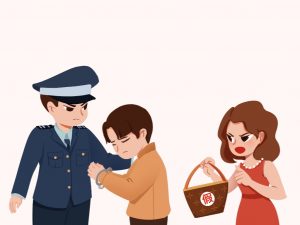Is Prostitution A Crime in Nigeria?: Prostitution is referred to as the world’s oldest profession. Prostitution is the act of engaging in sexual activity with another person in exchange for a monetary consideration. It is arguable whether prostitution amounts to a crime in Nigeria. Prostitution is clearly an unclean business; it is an act questionable by public morality. The state has the civil obligation to shun acts that attack the moral status of the state and thus preserve a respectable moral standard in the public. Balance must be placed; it is trite that the state in enforcement of the law is only concerned with acts and omissions that are illegal.

In other words, the law generally is not concerned with morality, although morality cannot be completely severed from legality. It could be argued that this is so because the principal Codes regulating crimes in Nigeria are founded on Christian and Moslem doctrines respectively. This could be the reason why almost every act that amounts to a sin also amount to an illegal act against the state. Take a negligible instance; the Christian doctrine condemns idleness; idleness is on the other hand a crime under the Criminal and the Penal Code Acts. If the Christian and Moslem doctrines forbid prostitution for being immoral, does it necessarily flow that it is illegal under the state law?
The answer seems safer when given in the negative. However, it follows that the state is ever ready to interfere in certain matters as long as public health and morality is concerned even when there is no express criminalization of the act in question. The state may interfere either in favour or against such acts. By interfering in favour of, the state makes policies targeted at regulating prostitution in the state. Policies such as compulsory health check, prohibition of minors’ involvement in prostitution, payment of tax by prostitutes, and so on. By interfering against, the state makes enactments expressly prohibiting the act of prostitution; the court may draw inferences to construe the wordings of the law in a manner prohibiting the act in question.

Recommended: Best Lawyers in Nigeria 2022
In countries like Denmark, Finland, Canada, Bangladesh, Austria, New Zealand, etc, prostitution is clearly legal but positively regulated. In Nigeria however, the question as to whether the act of prostitution is legal is unsettled. Now we shall make clear the position of Nigeria as to whether prostitution is legalized or not.
Generally, in Nigeria, there is no federal enactment that expressly prohibits prostitution. The principal penal laws of Nigeria which are the Criminal Code Act applicable in the Southern Region, and the Penal Code Act applicable in the Northern Region, do not have an express provision prohibiting prostitution. Section 36(12) of the 1999 constitution provides that a person shall be convicted of a criminal offence only if the act and or omission so committed or made constitutes a defined offence in a written law, having a penalty ascribed to it. The question consequent upon the perusal of the above constitutional provision is whether there is any written law that defined and proscribed the act of prostitution.

Also see: Best Law Firms in Nigeria 2022: Top 10
By definition of an offence, the provision so defining must highlight the physical and mental elements of which when present renders one criminally liable for the offence. There is no such provision in Nigerian laws. However, under the Sharia Law which is a native law applicable in the Northern Region, prostitution amounts to an illegal act.
Notwithstanding the fact that prostitution is not expressly defined in Nigerian laws, there are some provisions of the law that made allusions to prostitution from which an inference could be drawn to the effect that prostitution is abhorred in Nigeria. Section 223 of the Criminal Code Act deals with procurement of women or girls. Subsection 2 of the said section expressly mentioned “prostitute”. The section makes punishable with two years imprisonment, the act of procuring a woman or a girl in order to become a common prostitute.
Further in subsection 3 and 4 of the same section 223, a person who procures a woman or girl to become a brothel inmate for the purpose of prostitution is punishable with two years imprisonment. Section 223 deals specifically with procurement of another for the purposes of prostitution. If follows logically therefore that as long as ones does not procure another to get involved in prostitution, there is no liability for prostitution.

Recommended: Advantages and Disadvantages of being a Leader
Another relevant provision is section 224 of the Criminal Code Act deals with procuring women by threats, fraud, or by administering drugs on them for the purpose of defiling them. Under this heading, common prostitutes can be liable only if the prostitute procured another for defilement by threat, fraud or by administering drugs, and the provision of section 225 of the Criminal Code applies to a similar extent if a girl is abducted for the said purpose.
Another section up for consideration is section 225A of the Criminal Code Act which deals with trading in prostitution. The section punishes males who live on the earnings of prostitution, or who persistently solicits for immoral purposes in a public place, or a male or female who has control and influence over prostitutes in a manner suggesting that he is aiding, compelling or abetting them, and also the use of one’s premises for prostitution. The offence is punishable under the section. Keeping a brothel is equally punishable under section 225B. The exercise of control of the movements of a prostitute is also punishable by section 250 of the Criminal Code Act which deals with Rogues and Vagabonds.
In the Penal Code Act, section 405(d) prohibits the indecent or disorderly behaviour of a common prostitute in a public place who persistently solicits for prostitution with two months imprisonment. This provision is in pari material with Chapter 532 of the Federal Capital Territory, Abuja Penal Code.
Recommended: Countries with the best judicial system in the world
Section 15 of the Trafficking in Persons (Prohibitions) Law Enforcement and Administration Act also referred to and prohibits with punishment, procurement of persons for prostitution. An interesting thing about the Act is that it made use of “any person’, thus, it recognizes the fact that procurement of prostitution is not only restricted to women or girls.
Now, having highlighted these salient provisions of the relevant laws, is prostitution still not a crime in Nigeria?
The Criminal Code and Penal Code have been too cautious not to stretch the law too far. This could be perceived from the wordings of the relevant provisions. What the Acts did was to criminalize acts supporting, facilitating and promoting prostitution such as; procurement of persons, pimping, running a brothel, abducting persons for the purpose of prostitution, etc. prostitution was not in nowhere defined by the acts neither was its elements highlighted. This alone is a sufficient basis upon which prostitution does not amount to a criminal offence in Nigeria. Prostitution is however, abhorred in Nigeria from inferences by the relevant laws.
Recommended: Differences Between Void And Voidable Marriage
Conclusion
Prostitution is clearly an unclean business. Prostitutes in Nigeria have no legal basis backing up their business. In so many occasions they are faced with police harassments, extortion and arrests; and they are actually being charged to court and some convicted, though not on the ground of prostitution strict sensu, but on the relevant laws as suitable. The position of the legality of prostitution in Nigeria lies somewhere in between the fact that people are at liberty to use their body for that which they so desire, as long as it does not affect the public.

Edeh Samuel Chukwuemeka, ACMC, is a lawyer and a certified mediator/conciliator in Nigeria. He is also a developer with knowledge in various programming languages. Samuel is determined to leverage his skills in technology, SEO, and legal practice to revolutionize the legal profession worldwide by creating web and mobile applications that simplify legal research. Sam is also passionate about educating and providing valuable information to people.